Top 12 Culture Assessment Tools for Data-Driven HR in 2025
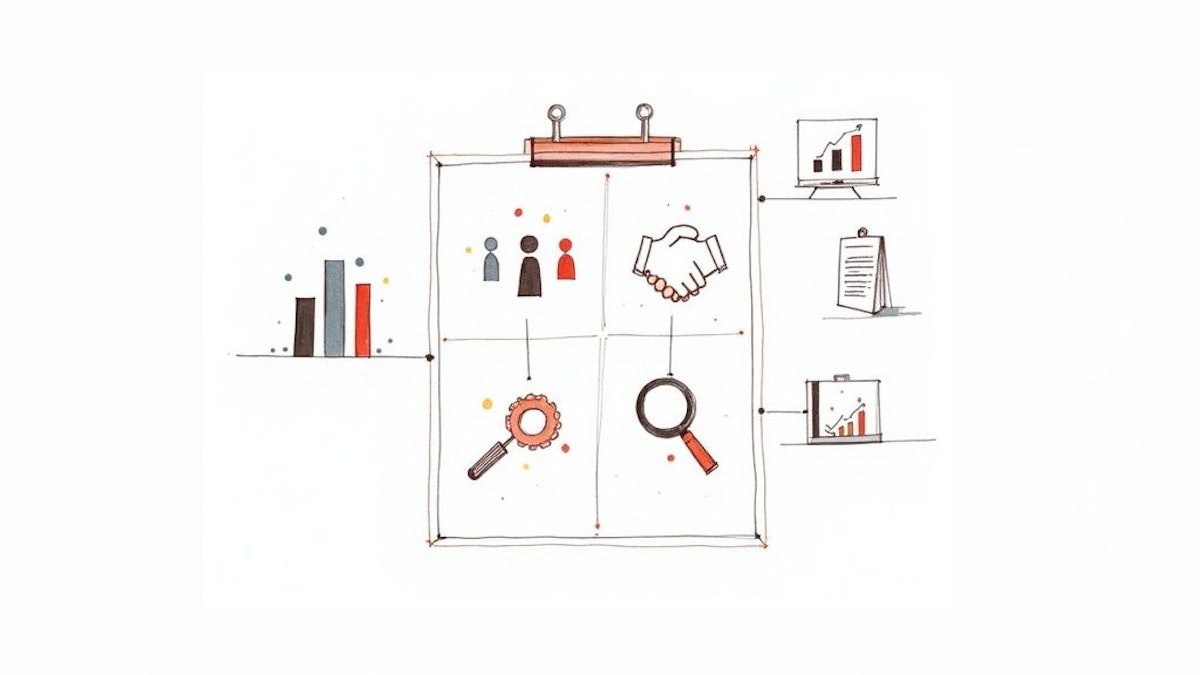
Organizational culture is no longer a vague HR buzzword; it's a measurable driver of performance, retention, and innovation. A strong, positive culture directly impacts your bottom line by reducing turnover, which can cost anywhere from one-half to two times an employee's annual salary to replace, according to a Gallup analysis. Investing in the right culture assessment tools gives you the data needed to move from guessing what your employees think to knowing how to build an environment where they can thrive.
This guide moves beyond marketing claims to provide an evidence-based analysis of the 12 best platforms available. We break down each tool's scientific foundation, practical use cases, pricing, and limitations to help you make a truly informed decision. For HR leaders and founders, understanding your cultural baseline is the first step in developing a stronger, more engaged workforce. By quantifying your culture, you can implement targeted initiatives that boost morale and loyalty. In fact, focusing on culture is one of the most effective proven strategies to reduce employee turnover and build a resilient organization.
Here, you'll find a detailed comparison of each tool, complete with screenshots and direct links, designed to help you select the platform that best fits your company's unique needs, size, and strategic goals.
1. MyCulture.ai
MyCulture.ai stands out as a premier culture assessment tool, offering a sophisticated, science-backed platform for organizations aiming to build cohesive and high-performing teams. It moves beyond generic personality quizzes by enabling HR leaders to create fully customized assessments grounded in proven organizational psychology. This ensures that every evaluation directly reflects a company’s unique values, communication styles, and critical workplace behaviors, providing a much deeper level of insight than one-size-fits-all solutions.
The platform's strength lies in its ability to translate complex cultural dynamics into actionable data. Users can design assessments in minutes to measure specific factors like values alignment, work-style compatibility, and even logical reasoning. The automated workflows and intuitive interface make it exceptionally user-friendly, from initial setup to the delivery of real-time, visually engaging reports. These data-driven summaries quickly highlight candidate fit, flag potential misalignment, and empower hiring managers to make confident, less biased decisions. This capability is critical, as research consistently shows that hiring for culture fit can significantly improve employee retention and engagement.
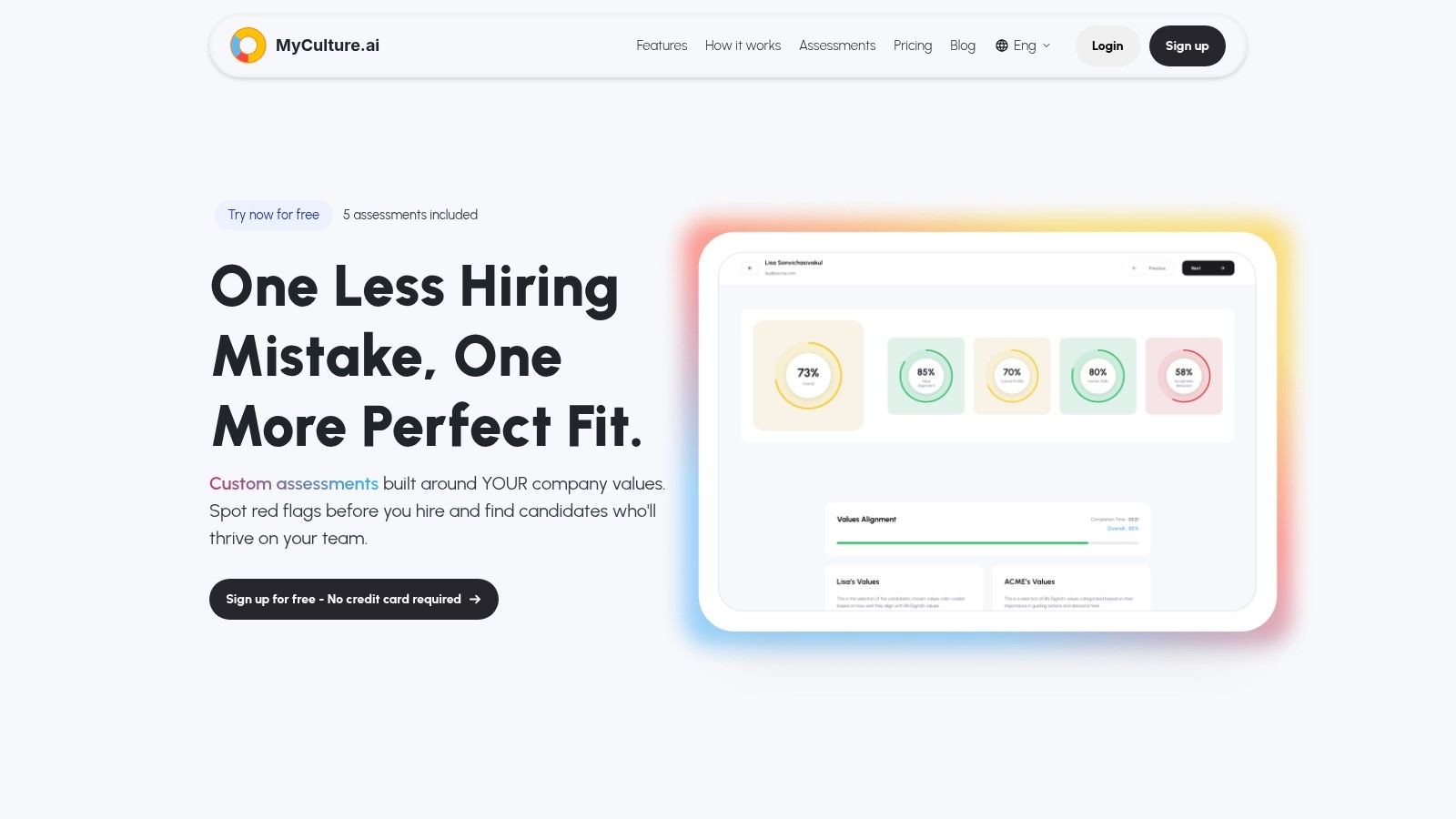
Key Features and Use Cases
- Customizable Assessments: Go beyond pre-built templates to measure the exact cultural attributes that define your organization. This is ideal for companies with a strong, distinct culture they need to protect and scale during growth.
- Comprehensive Manager Toolbox: MyCulture.ai extends its utility far beyond recruitment. It includes AI-powered tools for generating job descriptions, 30-60-90-day onboarding plans, and performance improvement plans, centralizing key HR functions.
- Team Dynamics Analysis: Use cohort comparison features to analyze existing team dynamics, identify cultural gaps, and inform team-building or restructuring initiatives. This makes it a valuable tool for both talent acquisition and organizational development.
Practical Considerations
MyCulture.ai offers a flexible pricing model, including a free plan with five assessment credits, making it accessible for startups. For larger organizations, paid plans unlock unlimited credits and advanced features like ATS integration and API access. While the platform is powerful, new users may need a brief period to familiarize themselves with its extensive feature set to leverage its full potential.
Website: https://www.myculture.ai
2. Culture Amp
Culture Amp is a comprehensive employee experience platform that positions itself as a leader among culture assessment tools by blending robust data science with actionable insights. The platform enables organizations to move beyond simple surveys, providing a full lifecycle approach to understanding and improving workplace culture. Users can deploy scientifically-validated surveys for engagement, onboarding, and exit interviews, all supported by an extensive library of templates.
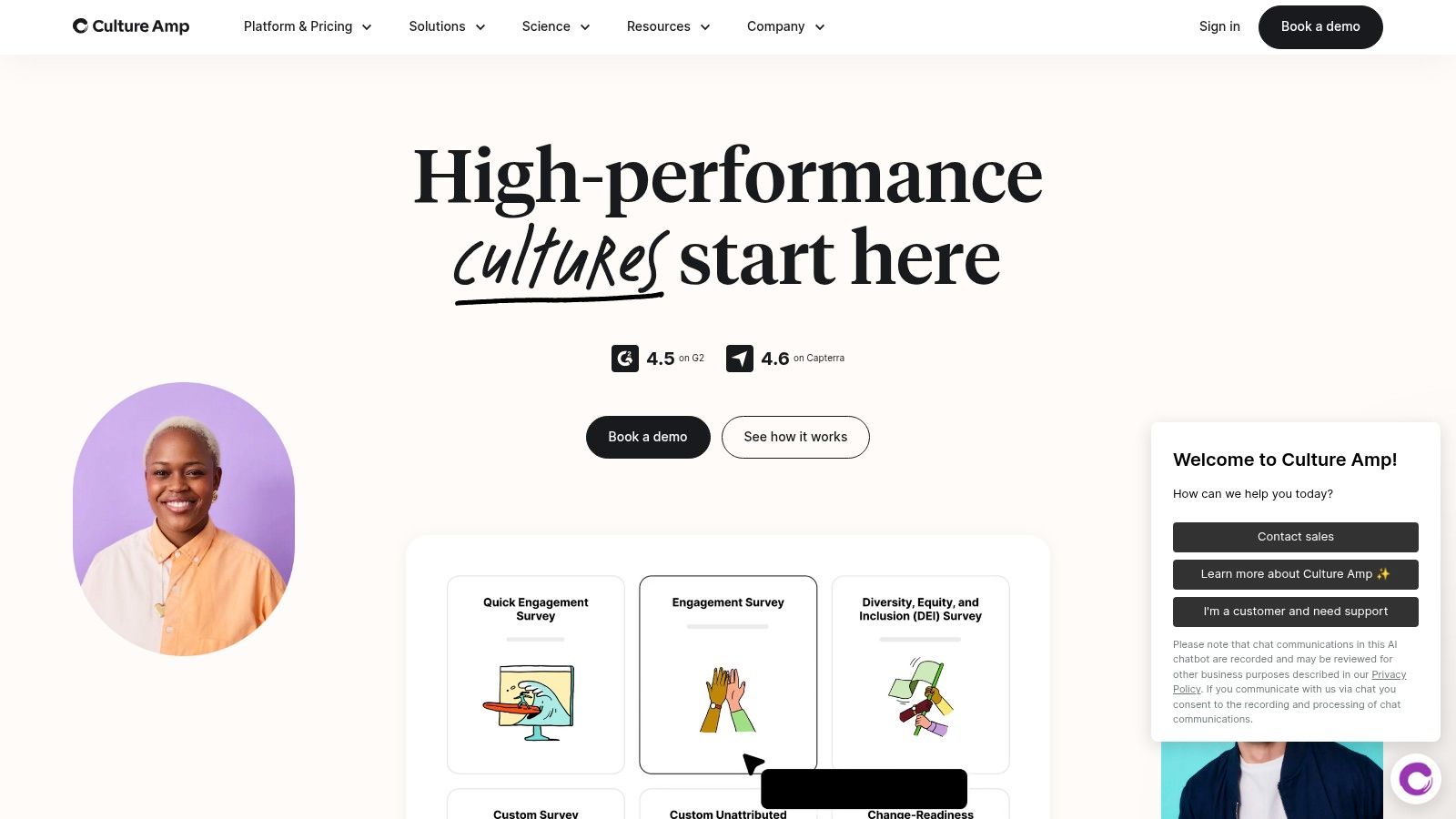
What truly sets Culture Amp apart is its powerful benchmarking capability, allowing companies to compare their results against similar organizations by industry or size. According to a Culture Amp analysis, companies in the top quartile for employee engagement see 23% higher profitability, highlighting the platform's focus on connecting culture metrics to business outcomes. The platform’s text analytics and AI-powered comment summaries help HR teams quickly distill qualitative feedback into strategic themes, making it easier to identify and prioritize action areas.
Key Details & Considerations
- Best For: Mid-market and enterprise companies seeking a holistic platform that links culture assessment to performance management and employee development.
- Key Feature: Extensive industry and size-based benchmarks provide critical context for survey results, helping organizations understand where they truly stand.
- Pros:
- Grounded in people science with a vast library of validated survey questions.
- Strong focus on turning data into manager-led action plans.
- High-level security and compliance (SOC 2, ISO 27001).
- Cons:
- Pricing is quote-based and requires an annual contract, making it a significant investment.
- The platform’s breadth can be overwhelming for small teams or those new to culture analytics.
Website: https://www.cultureamp.com
3. Qualtrics EmployeeXM
Qualtrics EmployeeXM is an enterprise-grade experience management platform that excels as one of the most powerful culture assessment tools for large, complex organizations. It provides a highly configurable system for capturing and analyzing employee feedback across the entire lifecycle, from engagement and onboarding to 360-degree reviews and exit interviews. The platform is designed to handle sophisticated data models and is particularly popular in regulated industries where robust data governance and security are paramount.
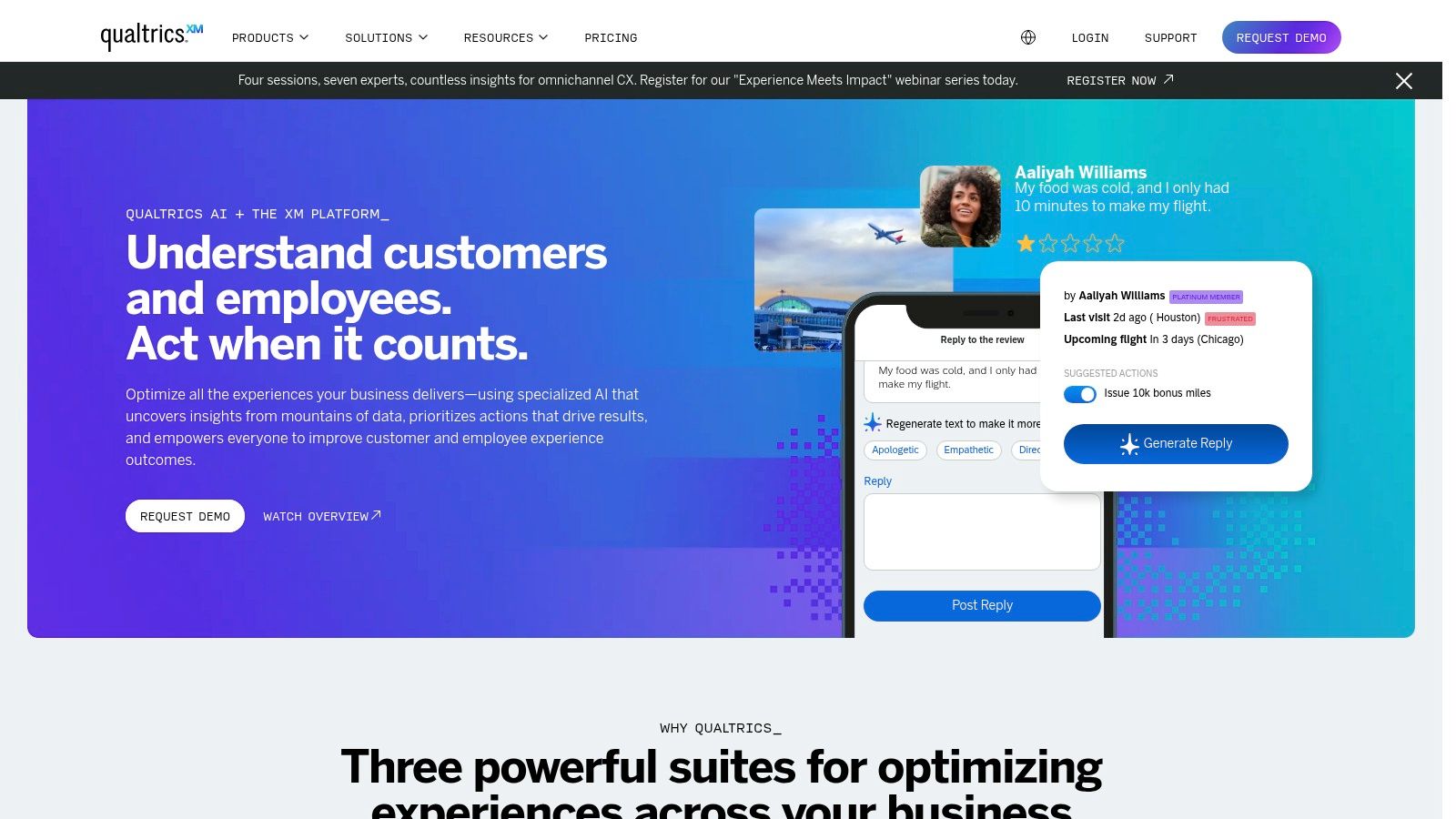
What sets Qualtrics apart is its sheer scalability and analytical depth. Its AI-driven iQ engine can parse millions of open-text comments to identify sentiment and key themes, providing deep, data-driven insights into cultural nuances. The platform's sophisticated dashboards and action-planning features are designed for large-scale deployment, enabling leaders at all levels to understand their team’s feedback and take targeted action. For those looking to get the most out of such a powerful system, you can learn more about translating complex metrics into strategy by understanding culture assessment results.
Key Details & Considerations
- Best For: Large enterprise organizations, especially those in highly regulated sectors, that require a fully customizable, scalable, and secure employee experience platform.
- Key Feature: Advanced AI-powered text analytics (iQ) that can analyze massive volumes of qualitative feedback to uncover hidden trends and sentiments about the workplace culture.
- Pros:
- Highly configurable to meet complex organizational structures and specific needs.
- Robust integration capabilities and enterprise-ready data governance and security.
- Scalable data model with powerful analytics and automation features.
- Cons:
- Pricing is quote-based and tailored for enterprise budgets, making it inaccessible for smaller companies.
- The platform's complexity demands skilled administrators and a significant implementation period.
Website: https://www.qualtrics.com
4. Microsoft Viva Glint
Microsoft Viva Glint enters the market as a powerful employee engagement and culture solution, deeply embedded within the broader Microsoft Viva employee experience suite. Positioned as one of the go-to culture assessment tools for organizations heavily invested in the Microsoft ecosystem, it leverages a continuous listening strategy. It enables companies to deploy recurring and ad-hoc pulse surveys, translating real-time employee feedback into actionable insights for managers and leaders.
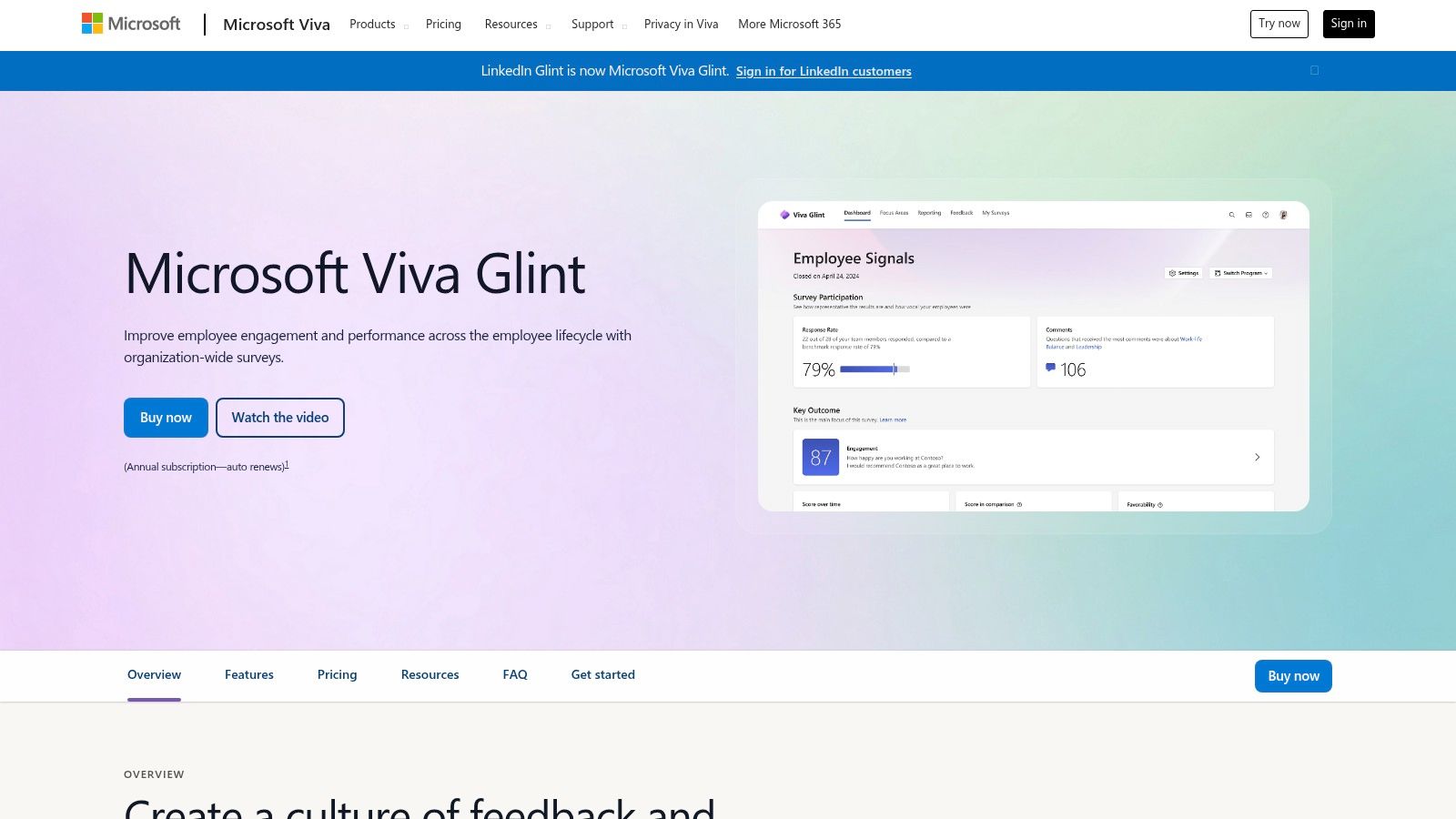
What makes Viva Glint unique is its native integration with Microsoft 365 and Teams. This connection allows for a seamless user experience, delivering surveys and results directly within the flow of work. According to Microsoft's 2023 Work Trend Index report, 57% of employees say they need better communication from leadership. Viva Glint addresses this by providing leaders with AI-driven summaries and sentiment analysis, helping them quickly understand and respond to employee concerns. Its integration with Viva Insights further connects engagement data with productivity patterns, offering a more holistic view of organizational health.
Key Details & Considerations
- Best For: Enterprise-level organizations already utilizing the Microsoft 365 and Viva suites that want to centralize their employee experience tools.
- Key Feature: Seamless integration with Microsoft Teams and the broader Viva platform, which brings culture assessment directly into daily workflows.
- Pros:
- High-level security and IT management are inherited from the Microsoft 365 environment.
- Provides access to a comprehensive ecosystem of workplace tools through the Viva Suite.
- Strong focus on manager empowerment with targeted insights and action plans.
- Cons:
- Pricing can be complex and is often bundled within Viva suite licensing, typically requiring negotiation through Microsoft partners.
- The platform’s value is maximized within the Microsoft ecosystem, making it less ideal for companies using other collaboration stacks.
Website: https://www.microsoft.com/en-us/microsoft-viva/glint/
5. Workday Peakon Employee Voice
Workday Peakon Employee Voice is an intelligent listening platform designed to help organizations improve engagement, culture, and retention through continuous dialogue. As one of the more sophisticated culture assessment tools, it leverages AI to deliver real-time insights, moving beyond periodic surveys to an always-on listening strategy. The platform integrates seamlessly into the broader Workday ecosystem, providing a powerful advantage for companies already utilizing Workday HCM.
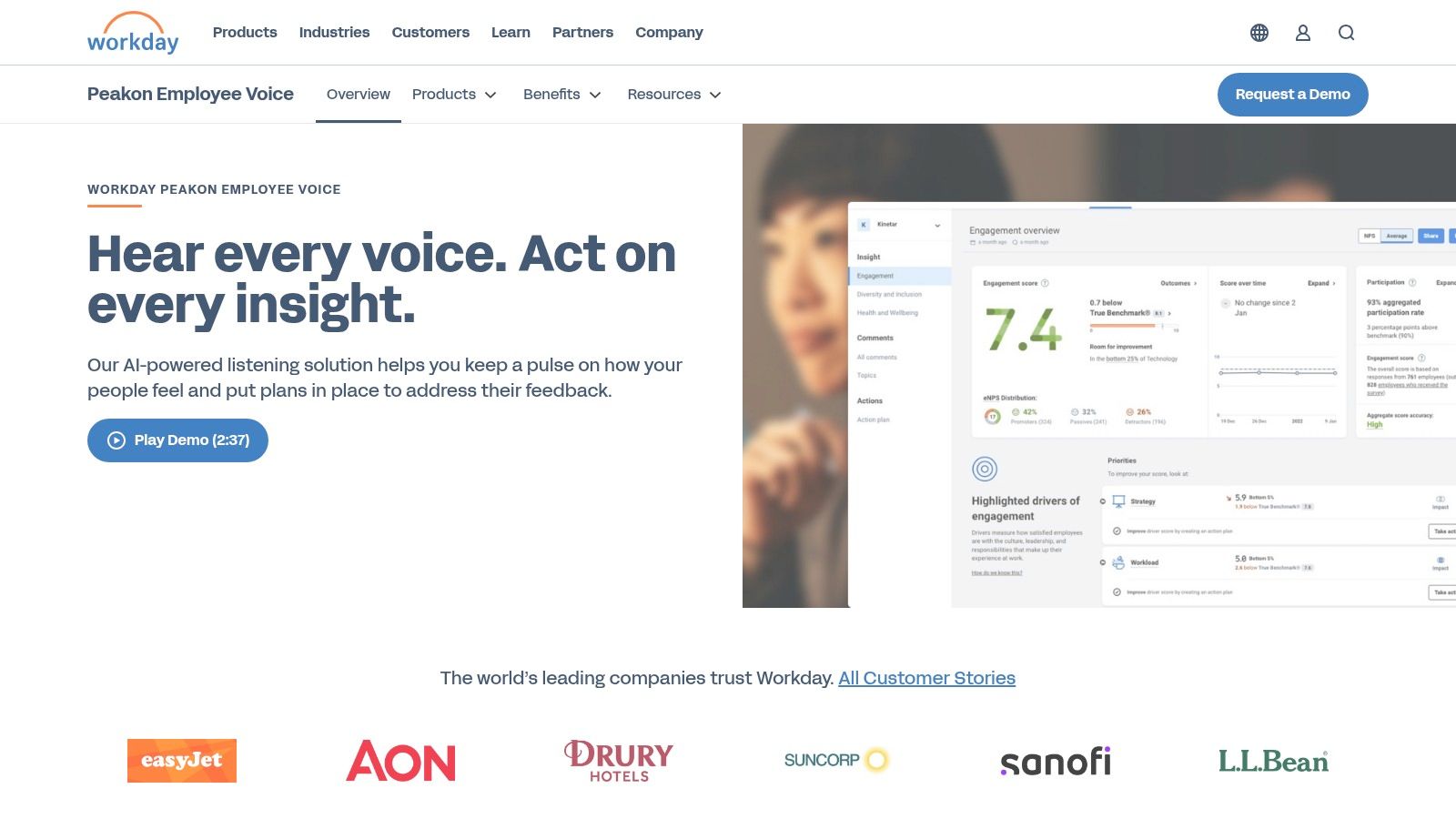
The platform’s strength lies in its "intelligent listening" technology, which automatically analyzes employee comments to identify themes and sentiment, reducing the manual burden on HR teams. It delivers personalized micro-surveys and provides managers with tailored, actionable recommendations based on their team's specific feedback. This approach helps translate cultural data directly into leadership development and targeted interventions. Its robust DEI&B (Diversity, Equity, Inclusion & Belonging) capabilities allow for deep analysis across various employee demographics, ensuring an equitable and inclusive culture.
Key Details & Considerations
- Best For: Mid-tier to enterprise organizations, particularly those already invested in the Workday HCM platform, seeking real-time, AI-driven culture insights.
- Key Feature: Seamless integration with Workday HCM data allows for highly precise segmentation and analysis, correlating culture metrics with performance, attrition, and other business data.
- Pros:
- Mature and scientifically-validated methodology supported by a large global dataset.
- Strong focus on empowering managers with real-time, actionable insights.
- AI-powered comment analysis saves significant administrative time.
- Cons:
- Pricing is quote-based and positioned for larger organizations.
- Maximum value is realized when used within the Workday ecosystem; it may be less cost-effective as a standalone tool.
Website: https://www.workday.com/en-us/products/employee-voice/overview.html
6. Gallup Q12
The Gallup Q12 survey is one of the most established and research-backed culture assessment tools available, focusing specifically on measuring employee engagement as a primary indicator of workplace culture health. Developed over decades of research, its 12 core questions are scientifically linked to key business outcomes like productivity, profitability, and retention. Organizations can deploy the Q12 as a standalone survey or integrate it into the broader Gallup Access platform for more comprehensive analytics and action planning.
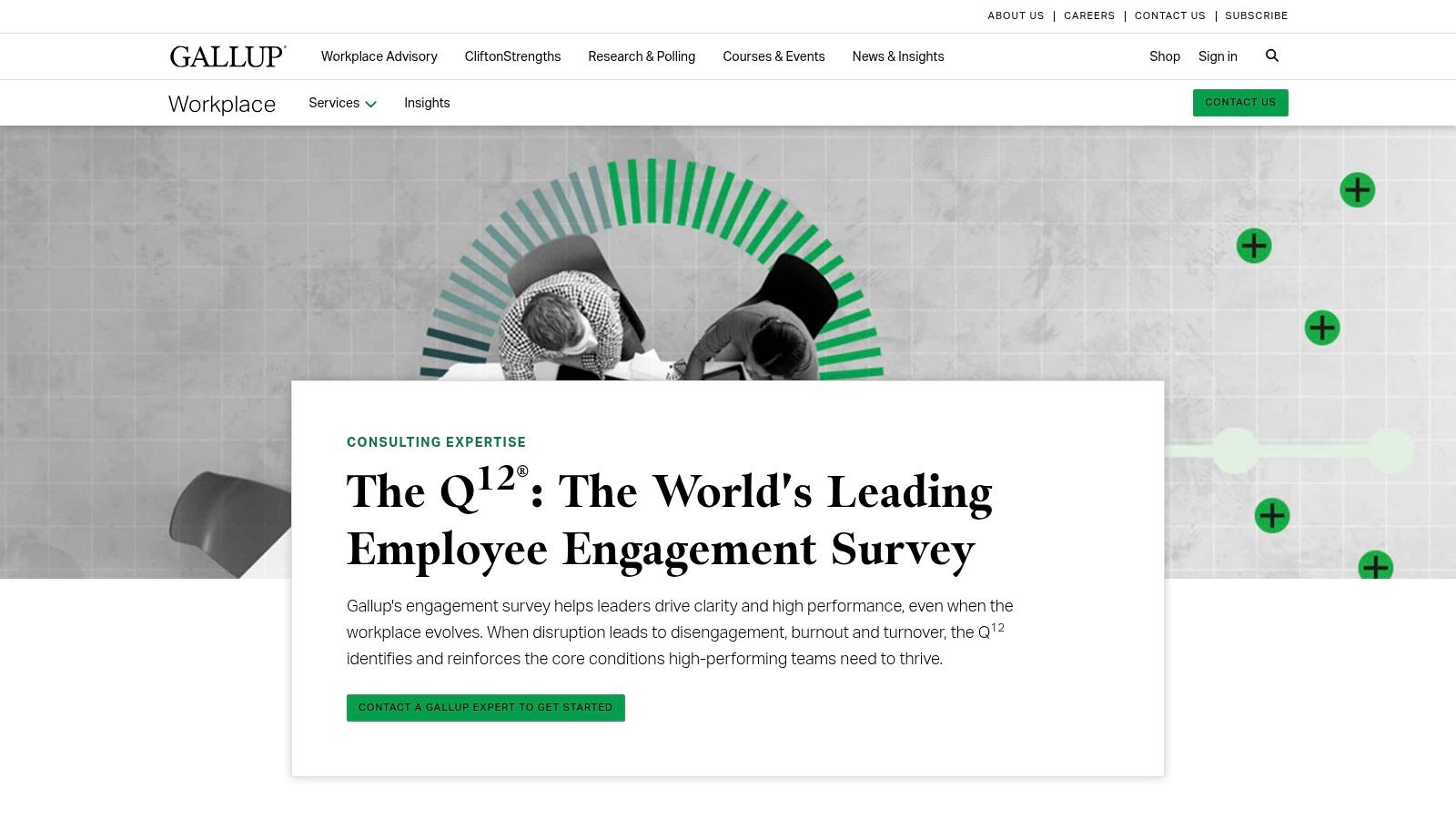
What makes the Q12 distinct is its simplicity and directness, making it highly accessible for managers and teams to understand and act upon. Gallup's meta-analysis of decades of data shows that business units scoring in the top quartile on employee engagement achieve 23% higher profitability than those in the bottom quartile. The tool is designed to provide a clear, focused snapshot of team-level needs, empowering managers with actionable insights rather than overwhelming them with complex data. This focused approach makes it a powerful starting point for organizations beginning their culture assessment journey.
Key Details & Considerations
- Best For: Small to mid-sized businesses or individual teams looking for a simple, proven, and manager-centric tool to measure and improve engagement.
- Key Feature: Its 12-question framework is rigorously validated by decades of research to correlate directly with performance outcomes, providing a clear and reliable metric.
- Pros:
- Strong research foundation supporting the tool’s validity.
- Clear and brief instrument is easy for employees to complete and managers to interpret.
- Focuses directly on actionable, team-level engagement factors.
- Cons:
- Limited breadth compared to broader employee experience suites.
- Additional platform subscriptions and add-ons increase costs for larger implementations.
Website: https://www.gallup.com/q12/
7. Denison Consulting – Denison Organizational Culture Survey
Denison Consulting offers a deeply researched approach to culture assessment, centered around its renowned Denison Model. This framework links specific cultural traits directly to business performance, making it one of the most results-oriented culture assessment tools available. The model assesses organizations across four key areas: Mission, Adaptability, Involvement, and Consistency. The core offering is the 48-item Denison Organizational Culture Survey (DOCS), which evaluates 12 distinct management practices that drive these four traits.
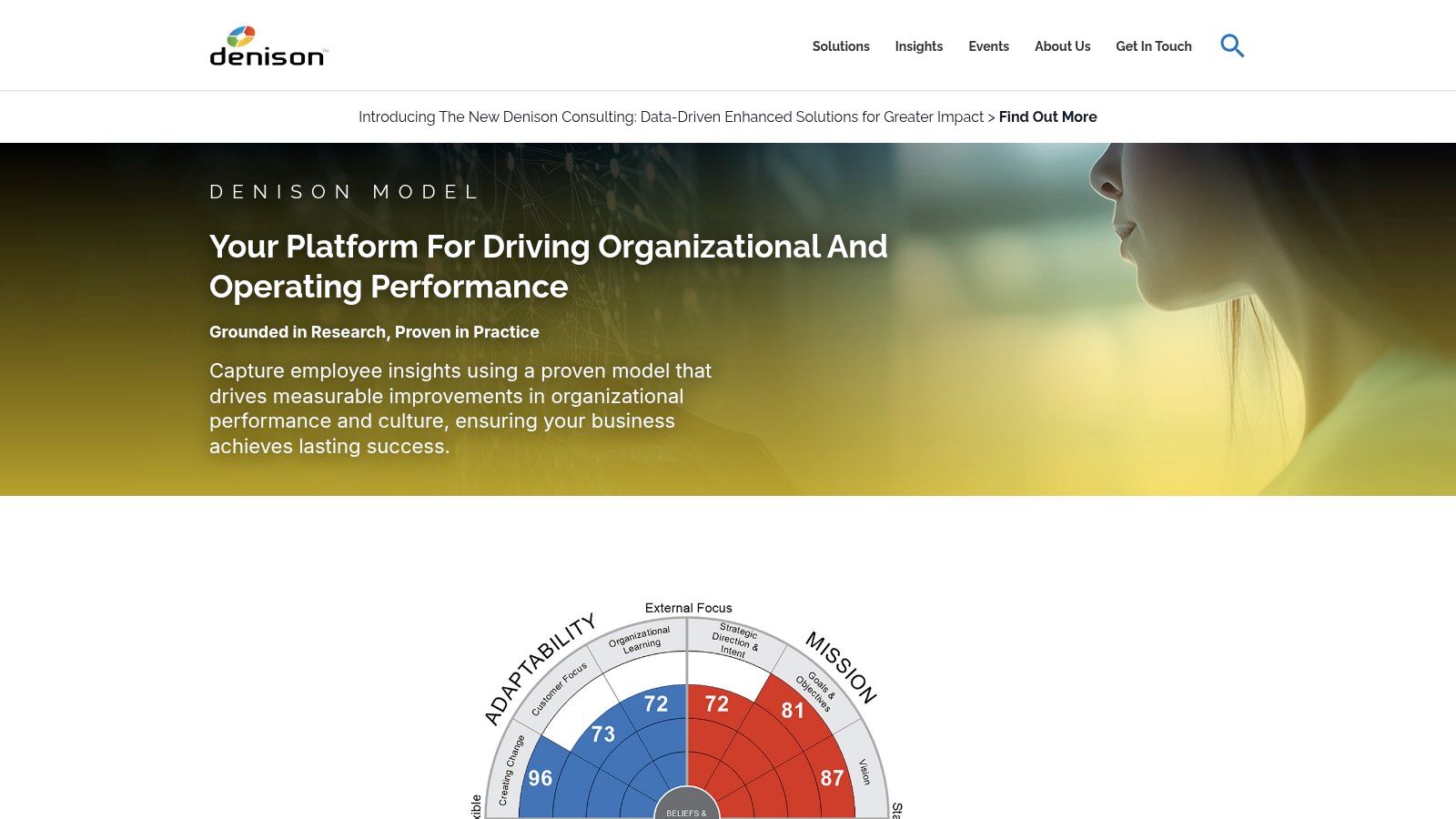
What distinguishes Denison is its blend of a validated diagnostic tool with deep consulting expertise, a popular model within US sectors. Organizations receive detailed reports with percentile benchmarks, comparing their culture to a global database of over 1,000 companies. Research published by Denison shows a correlation where organizations with high scores across all four cultural traits demonstrate superior performance in areas like sales growth, market share, and employee satisfaction. The platform also incorporates custom modules and AI-powered text analysis to enrich the quantitative data, providing a comprehensive view of organizational health.
Key Details & Considerations
- Best For: Organizations that prefer a consultant-led approach and want to establish a clear, data-driven link between their culture and tangible business outcomes like profitability and growth.
- Key Feature: The Denison Model's direct correlation between four specific cultural traits and business performance, supported by extensive research and global benchmarks.
- Pros:
- Strong, empirically-validated linkage of culture assessments to performance metrics.
- Consultant-led analysis and ongoing client support ensure data is translated into effective action.
- Offers lighter Scorecard versions for more targeted or preliminary assessments.
- Cons:
- Pricing is not public, and engagements typically require a 4 to 6 week cycle, representing a significant commitment.
- The model is less of a self-service tool and requires active participation in a consulting partnership.
Website: https://denisonconsulting.com/culture-surveys/
8. Human Synergistics – OCI/OEI
Human Synergistics offers some of the most established and deeply researched culture assessment tools available, anchored by its Organizational Culture Inventory (OCI) and Organizational Effectiveness Inventory (OEI). The OCI provides a robust diagnostic by measuring shared behavioral norms and expectations, categorizing them into Constructive, Passive/Defensive, and Aggressive/Defensive styles. This framework helps organizations visualize their current culture and define an ideal culture to strive for.
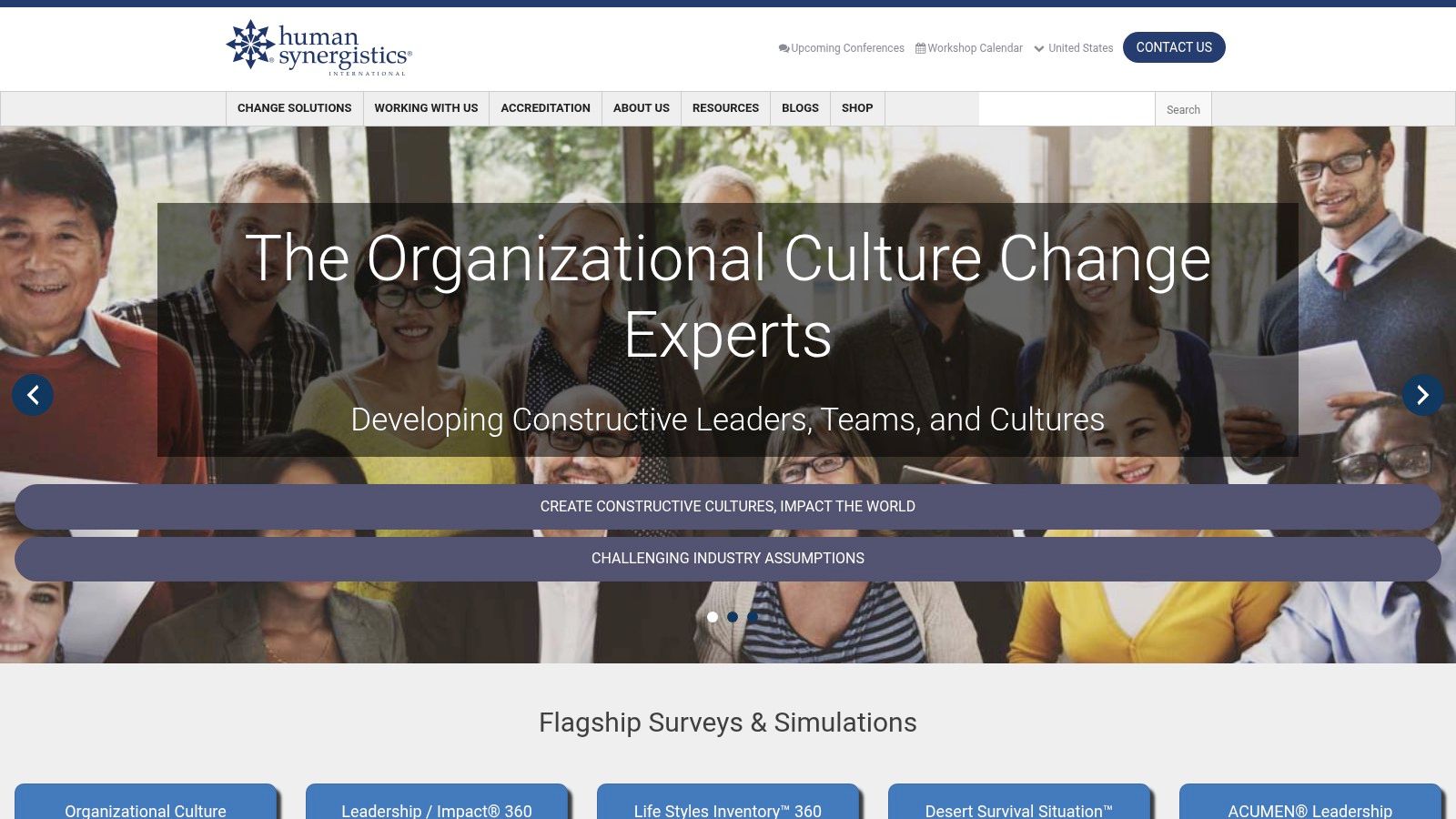
What sets this platform apart is its rigorous, academic approach and reliance on a certified practitioner model. The OEI complements the OCI by identifying the levers and causal factors, like leadership styles and organizational systems, that drive the current culture. This dual-inventory system provides a comprehensive, cause-and-effect roadmap for culture change. According to research published by Human Synergistics and Dr. Robert A. Cooke, organizations with strong Constructive cultures consistently outperform others on metrics like employee engagement, innovation, and service quality.
Key Details & Considerations
- Best For: Large organizations and consulting firms committed to a deep-dive, facilitator-led culture transformation initiative grounded in industrial-organizational psychology.
- Key Feature: The direct linkage between cultural norms (OCI) and organizational drivers (OEI) provides a clear and actionable framework for systemic change.
- Pros:
- Deep heritage and wide recognition backed by decades of research.
- Comprehensive training and access to an extensive global network of accredited practitioners.
- Provides both current and ideal culture profiles for clear goal-setting.
- Cons:
- Full usage often requires accreditation or hiring a certified consultant, adding to the cost.
- Pricing is quote-based and training fees are premium, making it a significant investment.
Website: https://www.humansynergistics.com
9. Barrett Values Centre – Cultural Transformation Tools
The Barrett Values Centre offers a unique, values-based approach to organizational analysis through its Cultural Transformation Tools (CTT). Unlike traditional engagement surveys, this methodology focuses on mapping the core values of an organization, its leaders, and its employees. It stands out among culture assessment tools by diagnosing "cultural entropy," the degree of dysfunction within an organization caused by limiting, fear-based values. This provides a clear metric for the friction that hinders performance and engagement.
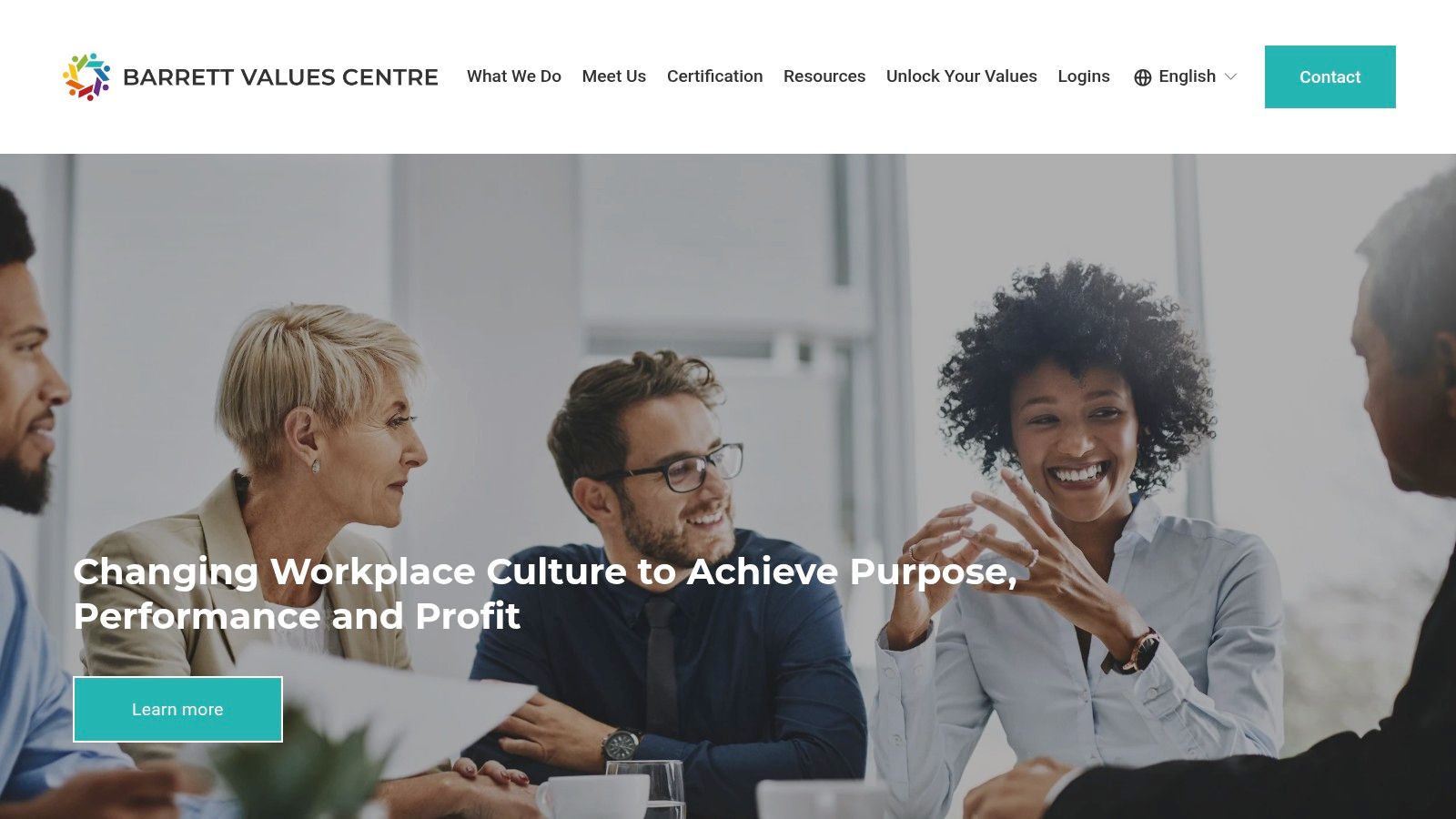
The platform’s strength lies in its diagnostic power, enabling organizations to compare their current culture (as perceived by employees) with their desired culture. The CTT assessment identifies shared and personal values, creating a roadmap for aligning employee motivations with strategic goals. A key feature is the consultant-led model, where certified practitioners guide organizations through the assessment process, from survey deployment to interpreting the detailed reports and facilitating transformation workshops. This hands-on support is designed to ensure the insights lead to meaningful change.
Key Details & Considerations
- Best For: Organizations committed to deep, values-driven transformation, often guided by external consultants or internal certified professionals.
- Key Feature: The "Cultural Entropy" score provides a unique and quantifiable metric for measuring the level of dysfunction and energy consumed by unproductive behaviors.
- Pros:
- Provides a deep, qualitative understanding of underlying organizational values.
- Flexible deployment supported by a global network of certified consultants.
- Complements traditional engagement surveys by revealing the "why" behind the numbers.
- Cons:
- Pricing is only available upon inquiry and often requires purchasing certification or consultant services.
- Full utilization of the tools typically necessitates undergoing a CTT certification program.
Website: https://www.valuescentre.com
10. Great Place To Work – Trust Index + Certification
Great Place To Work offers one of the most recognized employer branding programs in the United States, positioning its Trust Index survey as a key differentiator among culture assessment tools. Rather than just providing internal data, the platform's primary value lies in its Certification program, which allows companies to earn public recognition and eligibility for prestigious "Best Workplaces" lists. The process is centered around its 60-statement Trust Index, a standardized survey measuring core cultural pillars like credibility, respect, fairness, pride, and belonging.
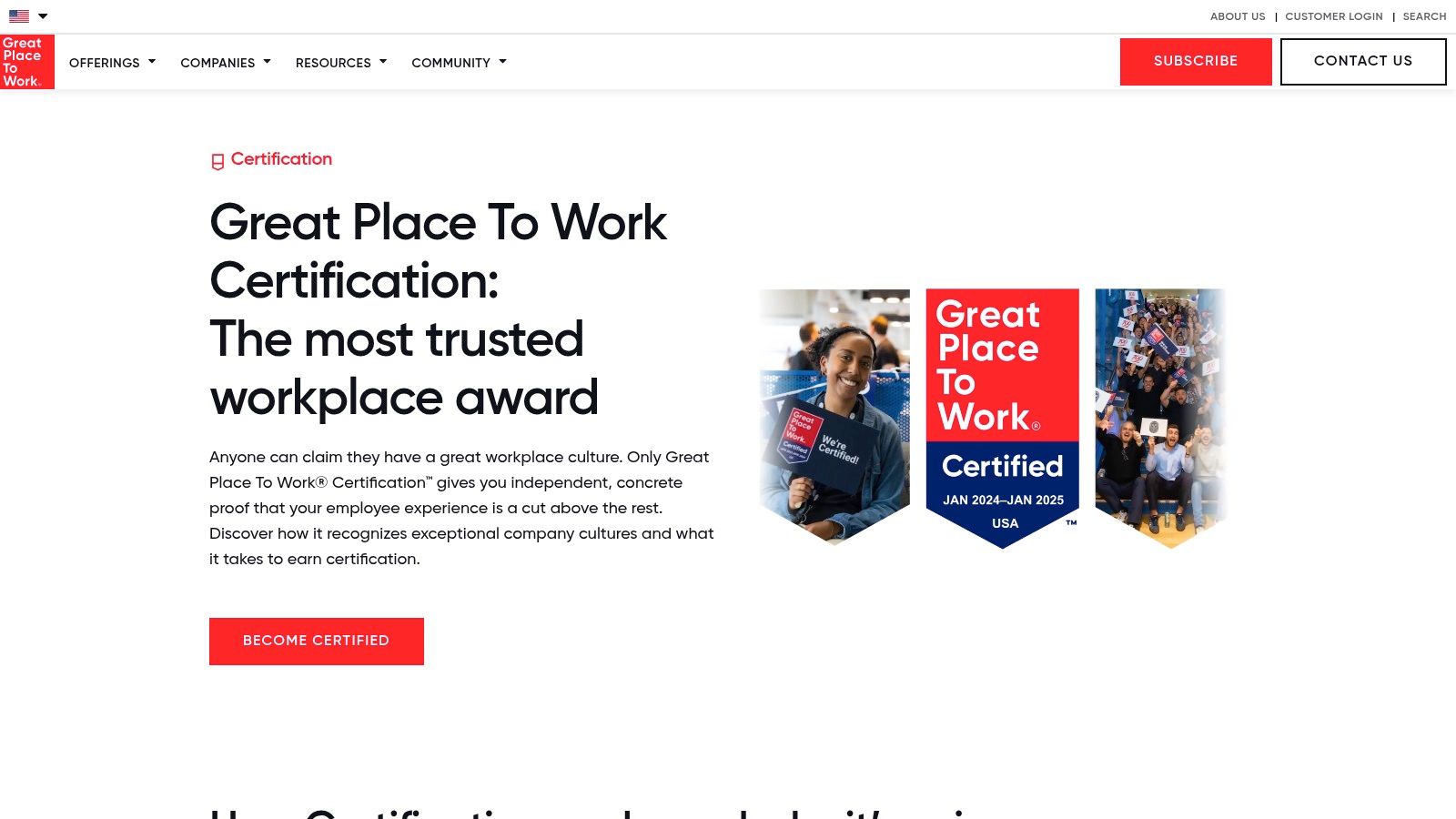
What sets this platform apart is its direct link between internal assessment and external employer brand enhancement. Achieving Certification provides companies with a powerful seal and marketing assets to attract top talent. Data from Great Place To Work indicates that Certified companies see 51% more voluntary applicants compared to non-certified peers. This focus on market recognition makes it a strategic choice for organizations looking to leverage their positive culture as a competitive advantage in the talent market.
Key Details & Considerations
- Best For: Companies of all sizes aiming to boost their employer brand and gain public recognition for their positive workplace culture.
- Key Feature: The prestigious Certification and eligibility for "Best Workplaces" lists provide a significant and tangible marketing and recruitment advantage.
- Pros:
- Strong employer brand impact and widely recognized certification seal in the US.
- Clear, standardized process for assessment and certification.
- Benchmarking against some of the best-performing companies.
- Cons:
- Pricing is quote-based, varies by company size, and can be a considerable investment.
- The survey focuses primarily on employee experience and trust, offering less customization for specific cultural domains.
Website: https://www.greatplacetowork.com/certification
11. OCAI Online – Organizational Culture Assessment Instrument
OCAI Online provides the official, web-based version of the highly respected Organizational Culture Assessment Instrument (OCAI), developed by professors Kim Cameron and Robert Quinn. Based on the Competing Values Framework, this tool is one of the most rigorously validated culture assessment tools available for academic and practical use. It allows organizations to quickly diagnose their current culture and identify their desired future culture across four distinct archetypes: Clan, Adhocracy, Market, and Hierarchy.
What makes OCAI Online stand out is its simplicity and focus on a specific, proven model. Rather than offering a broad suite of employee experience features, it delivers a targeted assessment that takes only about 15 minutes to complete. The output is a clear, visual culture profile that serves as a powerful starting point for strategic conversations, team workshops, and change management initiatives. This streamlined approach makes it exceptionally accessible for consultants, facilitators, and internal HR teams who need a reliable diagnostic tool without the complexity of a large-scale platform.
Key Details & Considerations
- Best For: Teams and organizations of all sizes, including consultants, who need a quick, academically validated framework to facilitate discussions about cultural change.
- Key Feature: Its foundation in the Competing Values Framework, a well-researched model that provides a clear and actionable lens for understanding organizational dynamics.
- Pros:
- Simple, transparent pricing with self-serve checkout options.
- Quick to deploy and complete, making it ideal for baseline assessments.
- Includes reports and facilitation kits to guide team discussions and workshops.
- Cons:
- Lacks the depth on specific culture drivers found in broader employee engagement platforms.
- Limited advanced analytics, benchmarking, and trend-tracking features.
Website: https://www.ocai.net
12. Perceptyx – People Insights Platform
Perceptyx is a dedicated employee listening and people analytics platform that provides large organizations with sophisticated tools for continuous culture dialogue. As one of the more focused culture assessment tools, it goes beyond annual surveys to enable a multi-channel listening strategy, incorporating engagement, pulse, lifecycle, and crowdsourcing feedback. The platform is designed to capture the employee voice at critical moments and translate that data into clear, prioritized actions for managers and leaders.
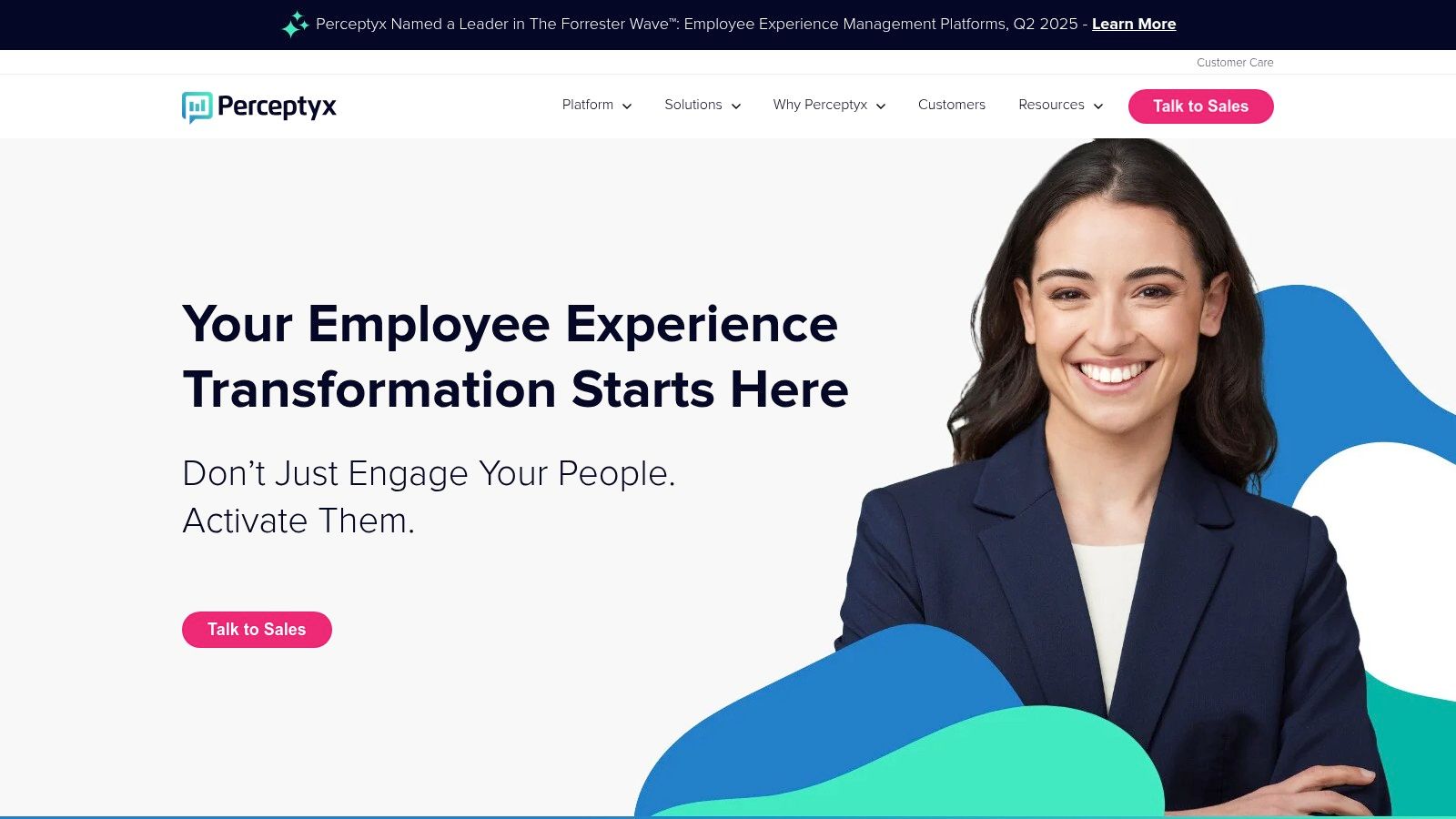
What sets Perceptyx apart is its strong emphasis on post-survey activation and manager enablement. The platform uses AI to deliver intelligent "nudges" and personalized action recommendations directly to managers, helping them build the capabilities needed to act on their team's feedback. For instance, in work with client O.C. Tanner, leveraging Perceptyx insights was a factor in achieving a 10-point increase in their Great Place to Work score. This focus on empowering managers turns high-level cultural intelligence into tangible, team-level improvements. For more on this, you can learn more about cultural intelligence assessments and their impact.
Key Details & Considerations
- Best For: Large enterprise organizations, particularly in the US, that require a robust, multi-channel listening platform with a heavy focus on analytics and manager action-planning.
- Key Feature: AI-assisted action planning and intelligent nudges for managers, which translate complex survey data into simple, guided steps to improve team engagement and culture.
- Pros:
- Deep expertise in employee experience with a pure-play focus.
- Strong post-survey activation support and manager development tools.
- Credible benchmark data from a large portfolio of enterprise clients.
- Cons:
- Pricing is quote-based and aimed at the enterprise market, making it less accessible for SMBs.
- The platform’s depth and complexity may be more than what smaller HR teams require.
Website: https://www.perceptyx.com
Culture Assessment Tools Comparison Matrix
| Platform | Core Features / Characteristics | User Experience / Quality ★ | Value Proposition 💰 | Target Audience 👥 | Unique Selling Points ✨ |
|---|---|---|---|---|---|
| MyCulture.ai 🏆 | Customizable culture & soft skills assessments; AI-powered HR toolbox; Automated reports | ★★★★★ | Flexible pricing: Free 5-assessments to enterprise | HR teams, Hiring managers, Enterprises & startups | Science-backed, bias-minimized hiring; Integrated Manager Toolbox; Secure data |
| Culture Amp | Engagement & pulse surveys; DEI & retention insights; Benchmarks | ★★★★☆ | Quote-based, costly for small teams | Mid-market & enterprise orgs | Extensive benchmarking; Action planning workflows |
| Qualtrics EmployeeXM | Employee lifecycle surveys; AI-driven insights; Enterprise IT ready | ★★★★☆ | Enterprise pricing, complex platform | Regulated industries, enterprise | Highly configurable; Scalable analytics |
| Microsoft Viva Glint | Recurring pulse surveys; MS 365 integration; Enterprise-grade security | ★★★★☆ | Variable pricing via partners | Microsoft 365 users | Seamless MS tech stack integration |
| Workday Peakon Employee Voice | Always-on listening; AI-generated summaries; DEI insights | ★★★★☆ | Quote-based, best with Workday HCM | Workday customers, mid to enterprise | Strong Workday integration; Mature analytics |
| Gallup Q12 | 12-item engagement survey; Benchmarks; Simple reporting | ★★★☆☆ | One-time purchase or subscription | Small to mid teams | Research-validated, manager-friendly |
| Denison Organizational Culture Survey | 48-item culture traits; Custom modules; Consultant analysis | ★★★★☆ | Consulting-based, 4-6 week cycle | Organizations seeking deep consulting | Business-linked culture results, AI text analysis |
| Human Synergistics – OCI/OEI | Culture profiles & effectiveness diagnostics; Practitioner network | ★★★★☆ | Quote-based with premium training fees | OD professionals, large orgs | Established assessments; Accredited facilitation |
| Barrett Values Centre – CTT | Values-mapping across levels; Certified programs; Multi-language | ★★★★☆ | Pricing on inquiry, certification needed | Values-driven orgs, consultants | Unique values focus; Consultant support |
| Great Place To Work – Trust Index | 60-statement trust survey; Certification; Workplace awards | ★★★★☆ | Quote-based, varies by size | Employers seeking brand impact | Recognized Certification; Employer branding |
| OCAI Online | Quick culture profiling; Licensing tiers; Workshop facilitation kits | ★★★☆☆ | Fixed transparent pricing | Teams & enterprises | Accessible competing values framework |
| Perceptyx – People Insights Platform | Multi-channel listening; AI nudges; Benchmarks & program design | ★★★★☆ | Sales-led pricing, enterprise focus | Large enterprises | Strong post-survey activation; AI support for managers |
Making Your Final Decision: From Data to Action
Selecting the ideal culture assessment tool from this comprehensive list can feel daunting, but the right choice hinges on a clear understanding of your organization's unique needs and strategic goals. We've explored a wide spectrum of platforms, from enterprise-grade post-hire engagement suites like Culture Amp and Qualtrics to specialized, science-backed pre-hire tools like MyCulture.ai. The key takeaway is that there is no single "best" tool; there is only the best tool for your specific context.
Your decision should be a strategic one, guided by your primary objective. Are you aiming to reduce costly hiring mistakes and improve candidate-to-culture alignment from day one? Or is your focus on measuring and improving the engagement of your current workforce? The answer will steer you toward very different solutions.
Key Factors for Your Final Selection
Before you commit, re-evaluate your decision against these critical factors to ensure the platform you choose delivers lasting value:
- Primary Use Case: Pinpoint your most pressing need. Is it pre-hire screening, post-hire engagement, organizational change management, or leadership development? A tool designed for pre-hire like MyCulture.ai will offer different features and methodologies than a post-hire feedback platform like Microsoft Viva Glint.
- Scalability and Integration: Consider your future growth. Will this tool scale with your company? Does it integrate seamlessly with your existing HR tech stack, such as your Applicant Tracking System (ATS) or Human Resource Information System (HRIS)? A lack of integration can create data silos and administrative burdens.
- Actionability of Insights: Data is only valuable if it leads to action. Look for tools that provide clear, prescriptive recommendations and empower managers to have constructive conversations. According to Gartner research, feedback without a clear path forward can actually decrease employee engagement. A platform that merely presents dashboards without guiding you on next steps is a missed opportunity.
- Implementation and Support: Assess the resources required for a successful rollout. Does the vendor offer robust onboarding, training, and ongoing customer support? A complex tool with poor support can quickly become shelf-ware, failing to deliver any return on your investment.
Turning Cultural Insights into a Competitive Edge
Ultimately, the goal of using any of these culture assessment tools is to transform culture from an abstract concept into a tangible, strategic asset. The data you gather should fuel smarter hiring decisions, foster a more inclusive environment, and directly impact employee retention and performance. This process requires a continuous commitment to learning and adaptation.
To truly transform data into action and ensure your cultural strategies remain cutting-edge, it's essential to stay abreast of the crucial tech trends in education and organizational development that are shaping how insights are gathered and leveraged. By investing in the right platform and committing to an action-oriented approach, you equip your organization to build a resilient, high-performing culture that serves as a true competitive advantage in the modern workplace.
Ready to make smarter, data-driven hiring decisions? MyCulture.ai provides science-backed pre-hire assessments that measure culture fit with unparalleled accuracy, helping you build stronger teams from the very first interview. Discover how our platform can reduce turnover and enhance performance by visiting MyCulture.ai to learn more.